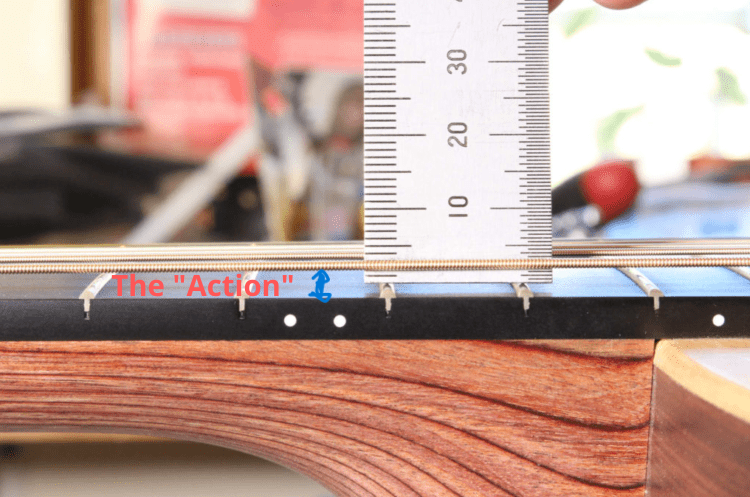Learning to play guitar is a wonderfully rewarding journey for anyone that is willing to put the time and effort into it. With so many types of guitars to choose from though, you might be wondering which one to learn first. The electric guitar is one great option but a question that frequently comes up is how easy is it to learn? Electric guitars are usually the easiest guitar to learn for beginners. Electrics have the advantage of thin guitar strings, the distance from the strings to the neck is shorter, and they are a lot smaller than acoustic guitars. I want to make it clear that although the electric guitar is “easier” to learn, no guitar is truly a walk in the park. Read on to learn about what makes electric guitars easier for beginners, some tips on learning the electric guitar, and reasons why or why not to choose an electric guitar as your first.
Why is an Electric Guitar Easier to Learn?
Beginners most frequently start off on either an acoustic or an electric guitar. Neither guitar is wrong but there are some key differences. Acoustic guitars, tend to have a higher “action”, the “action” is the distance between the fretboard and the string.

A high action will make it more difficult to sound notes when pressure is applied with your fingertips. The difficulty is compounded when you purchase an acoustic guitar on the cheaper side as inexpensive acoustic guitars tend to have higher actions. Electric guitars on the otherhand, tend to have a low action, which makes it far easier to press the string down. This might not sound like a big deal, but it will make a big difference early on as you are learning. You can check out an article on electric guitar strings here.
Electric guitar necks also tend to be thinner which will make it easier for beginners to get their hands around. I say “tend” because the neck width varies significantly between guitars, there are plenty of examples of wide neck electric guitars out there.
Electric guitars are quite a bit smaller than acoustic guitars. This can make a little difference in how you learn, especially if you are a smaller person. That being said, there is a tradeoff. Yes, electric guitars are smaller but they also are significantly heavier than acoustic guitars.
How Long Does it Take to Learn the Electric Guitar?
While there is no set time and hours that you need to clock in, beginners can typically learn the basic chords, become comfortable with reading music, and play several songs with an electric guitar with a year of consistent practice. I want to remind you though that learning to play an electric guitar is not really about the amount of time that passes, what is important is how many hours you can put into learning the instrument. Even though electric guitars tend to be easier to learn than acoustics, they still require a considerable amount of time and effort to develop any real proficiency.
If you want to speed up the process a little bit, here are a few tips to help ensure that you are getting the best bang for your buck when you practice an electric guitar.
- Download a metronome app. Metronome are incredibly popular apps that essentially create a steady pulse while you play the guitar. They are used to help you maintain a consistent tempo which is an incredibly important part of being a beginner electric guitarist. No need to spend any money on these as there are plenty of solid metronome apps out there for free!
- Check out one of the remote learning platforms. Covid has sparked an explosion of creativity in the guitar space when it comes to online learning. There are now a variety of online guitar lesson classes available and they are far cheaper than hiring a tutor. You’ll have to fork over a little money for these but it will be well worth the cost. Fender Play is a highly rated course that is also extremely popular among beginners. Guitartricks.com is another online course that it well rated.
- YouTube has not been a wastebin depository for cat videos for many years. Everyone is on YouTube these days and there is tons of free content. Marty Music is a popular YouTube channel with tons of content and some guitar lessons specifically for beginners on the electric guitar.
Other Advantages of Learning an Electric Guitar
If you have neighbors, a spouse, parents, or a dog, they might worry about you buying a new guitar and being kept up late at night while you have jam sessions in your garage. You might assume that an electric guitar is going to be significantly louder than another guitar but that is not necessarily the case.
Electric guitars require an amp and it’s true that if you want to jam out they can get very loud, very quickly. On the otherhand, electric guitars have solid bodies and produce very little noise on their own. You can easily plug your guitar into a pair of headphones or computer and it will play so quietly that people in the next room won’t hear you.
Acoustic guitars have hollow bodies and there is simply no way of getting around the fact that they do generate noise. There are various things you can do to temper down that noise such as: (i) buy a feedback dampener, (ii) buy a silent travel guitar, or (iii) use an acoustic guitar silencer. Even with these solutions though, overall acoustic guitars will be louder than your electric option.
Disadvantages of First Learning an Electric Guitar
One of the biggest things to consider for most beginners is the cost. Guitars are not cheap instruments and even a starter electric guitar will run you several hundred dollars. If you are concerned about the cost you should be aware that a decent starter electric guitar is going to cost more than an acoustic guitar.
Not only do you need to consider the cost of the electric guitar, but you also need to consider that you will need to purchase an amp and a guitar lead for an electric. Most electric guitars will not come with a lead and if it does it will likely be of sub-par quality.
You don’t absolutely need an amp right out of the gate, you can use your computer, but at some point, you will want to get an amp. If you want something decent, an electric guitar amp will typically set you back at least $200. If you don’t have an amp out, you can check out this article on alternatives to practicing an electric guitar without an amp.
Summary of Pros & Cons of Learning an Electric Guitar First
Pros | Cons |
Lower action makes it easier for beginners to sound notes. | Electric guitars are more expensive than acoustics for beginners and you need additional equipment. |
Neck tends to be thinner, making it easier to get hands around. | Chords can feel more difficult because there is less space between each string. |
Can be played quietly enough to where people will not hear in the room over. | More complex controls system – knobs, pickups, and switches. These can be intimidating for beginners. |
Conclusion
To conclude, there is no right or wrong way to go when considering which guitar you want to learn first. Electric guitars are an excellent option and as we have discussed, they tend to be easier to learn than other guitar styles. That being said, no guitar is truly “easy” to learn, and becoming proficient in the electric guitar will require you to put in the hours it takes to learn! Check out more articles on guitars here.
